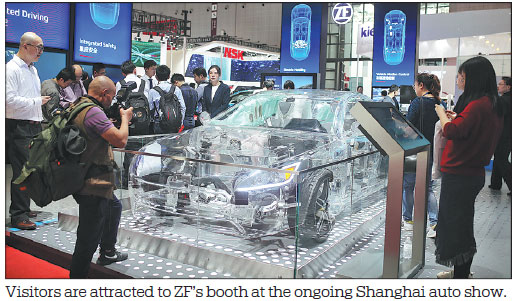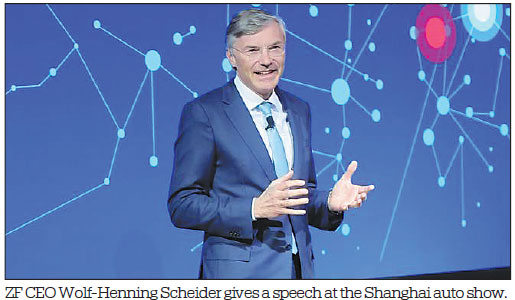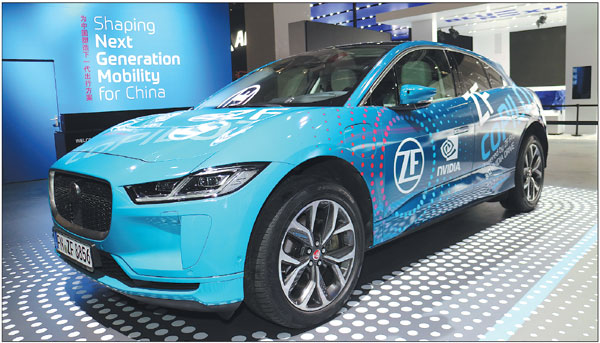ZF to deepen localization efforts in China for next-generation mobility
ZF Friedrichshafen AG is to increase production and development in China in terms of electrification and autonomous driving as the technologies perceived for future mobility are gaining a bigger momentum in the country, according to top executives.
The Germany-based global technology company is presenting its latest solutions in those aspects at the ongoing Shanghai auto show, which are to support the ambitions of both local Chinese customers and international companies in terms of next-generation mobility.
"We believe automatic driving will be highly appreciated in China with its highly dense traffic in urban areas. We believe the demand will be tremendous here," CEO Wolf-Henning Scheider told China Daily on Wednesday.
|
ZF's coPILOT vehicle makes its global debut in Shanghai, showing Level 2 plus autonomous functions. Photos Provided to China Daily |


Of ZF's exhibits in Shanghai for future mobility is a supercomputer, the ProAI RoboThink, which is making its premiere in Asia.
It is the most powerful central processing unit in the automotive industry, capable of computing performance of more than 150 teraOPS, or 150 trillion calculation operations per second. It can be extended to up to four units, offering a total performance of 600 teraOPS.
Combined with ZF's suite of sensors, the system is capable of delivering Level-4-plus autonomous driving functions and shared service.
The company also is holding a global debut of its coPILOT vehicle, showing its solution for urban mobility with Level-2-plus autonomous functions.
Based on its ProAI Gen2 supercomputer and Nvidia software, the system will offer comfort to drivers and help ease urban traffic congestion and cut pollution, among others, said Scheider.
It can monitor individual driving behavior as well as the interior of the vehicle in order to help prevent or mitigate hazardous situations.
The system's volume production is scheduled to start in 2021, according to the company. ZF offers a number of products already in series production in the fields of autonomous driving and e-mobility. In China, the company is getting a firmer foothold through increased production and development capabilities in the country.
"China is already the world's largest automotive market and it will be a trendsetter in many other aspects of future mobility as well," said Scheider.
The company expects 30 percent of its global sales will come from the Asia-Pacific region in the future, in which China will play a dominant position. Last year, sales in China accounted for 80 percent of the total from the region.
"To achieve this, we will further develop our solutions to address next-generation mobility for the Chinese market through enhanced local development and investment, strengthened local leadership and participation in the local mobility ecosystem," said Scheider.
It now has nearly 40 production sites in 24 cities in China and will increase its localization by up to 100 percent in the coming years.
One example is ZF's new steering plant in Zhangjiagang, Jiangsu province - its largest steering plant worldwide and its largest investment in the Asia-Pacific region to date.
Two joint ventures with Chinese commercial vehicle manufacturer Foton started operations earlier this month, further improving ZF's production capacity and localization in China. The factory in Hangzhou, Zhejiang province, is expected to achieve series production of electric drive products by March 2020.
"I am asking my teams to be really speedy so we are talking about a few years, say, two to three years, to achieve the target," said Scheider.
ZF is now developing autonomous driving and e-mobility solutions in China as well as its conventional systems, reinforcing its commitment to full localization.
Holger Klein, a ZF board member responsible for Asia-Pacific, said, "ZF's development capabilities in China are keeping pace and providing customers in China with high quality products and services." ZF said Chinese vehicle manufacturers are playing an increasingly important role in its global growth strategy.
ZF China President Renee Wang said the company is committed to developing tailored solutions to help meet the growth aspirations of its local customers.
"Innovation and speed is very important in the automotive industry if we want to be perceived as a leading technology company and partner of choice. This is particularly true for the Chinese market��we must achieve 'China Speed'," said Wang.
(China Daily 04/22/2019 page17)















